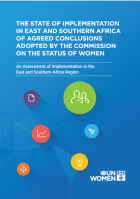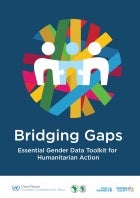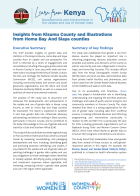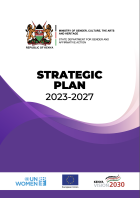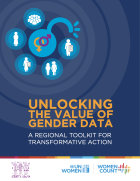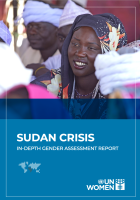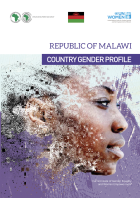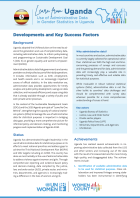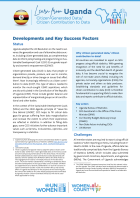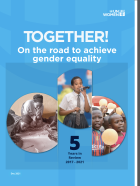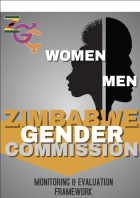1 - 20 of 27 Results
Pagination
Date:
The Commission on the Status of Women (CSW) monitors gender equality commitments and the Beijing Declaration. A study by UN Women East and Southern Africa assessed CSW63–CSW66, finding strong treaty ratification but weak policy implementation. Challenges include inadequate funding, weak national preparations, and limited African influence in CSW negotiations. Recommendations include strengthening coordination, enhancing stakeholder engagement, and improving CSO participation to boost Africa’s impact in global gender equality discussions.
Date:
This toolkit is aimed at providing an easily accessible compendium of resources available for the production and use of gender data in humanitarian settings. It is tailored to build capacity and provide guidance to governments, civil society organizations (CSO), humanitarians working with data, information managers, managers, decision makers, statisticians, and users of gender statistics. The contained tools can be used in support of key humanitarian planning and operational processes, including advocacy, strategy and policy formulation, planning, resource allocation, monitoring, and evaluation.
Date:
Ethiopia has demonstrated thought leadership in the use of gender data to meet national priorities and address gaps to achieve these as well as SDG targets on gender equality and women’s empowerment (GEWE) and others. Gender data has notably been used to improve and safeguard education opportunities for girls, boost agriculture and productivity, particularly for female-headed households including through addressing land ownership, and to address issues of gender-biased violence.
Date:
Kenya has demonstrated thought leadership in the use of administrative and citizen data for statistical purposes and harnessing official data to meet national priorities and SDG targets including on gender equality and women’s empowerment. This product highlights tangible achievements and lessons in improving access to and use of this data to influence policy and decision-making and improve the lives of women and girls in Kenya.
Date:
The Publication is a detailed strategic plan for the period 2023-2-27. It highlights previous achievements, lessons and emerging issues that define the policy direction of the gender sector achieving a society free from gender discrimination and violence
Date:
This Toolkit is designed to support the enhanced use of existing gender data and statistics in policy, advocacy, planning, and accountability in East and Southern Africa. The production and use of gender statistics is a complex process that requires deliberate efforts to connect, incentivize, and influence.The strategies outlined provide guidance and user-friendly tips on how to influence, direct, and monitor the pace of progress towards achieving gender equality and women’s economic empowerment and using gender data and statistics.
Date:
This product is related to the Be Like Tanzania series and part of an ongoing regional study. The study aims to showcase developments, achievements and lessons in the uptake and use of gender data and statistics in East and Southern Africa as part of experience-sharing and particularly south-south learning towards promoting the communication and use of gender data and statistics for policy- and decision-making to improve the lives of women and girls.
Date:
The assessment utilized the gender inequality framework used in humanitarian settings. The framework considered how the gender inequalities prevalent in pre-conflict contexts are exacerbated by conflict dynamics and how the impact differs with different gender roles. The framework indicates that the humanitarian responses should consider the basic livelihood needs and investigate and address some strategic issues that promote
Date:
This Report presents the Africa Shared Research Agenda (ASRA) for ending gender-based violence (GBV), which was developed though a collaboration between UN Women Africa and the Sexual Violence Research Initiative. The ASRA is a set of research priorities for the field, developed through a participatory and consultative process and aims to inform investments in research over the coming 5-10 years for ending GBV in Central, East, Southern and West Africa.
Date:
The Malawi Counrty Gender Profile publication presents a review of existing gender issues identified through a review of documents and reports recently released. The generic purpose of Country Gender Profile is to strengthen national understanding and data on the advancement of international, regional and national commitments towards Gender Equality and Women's Empowerment.
Date:
Uganda has demonstrated thought leadership in the use of administrative data for statistical purposes in its efforts to meet national priorities and address gaps to achieve the Third National Development Plan (NDPIII) and SDG targets including on gender equality and women’s empowerment. This brief highlights some of Uganda’s achievements and lessons in improving the quality and use of this data to address violence against women and girls (VAWG).
Date:
Uganda's the national statistical system (NSS) has sought to respond effectively to the surge in demand for gender data by using existing legal infrastructure, coordination mechanisms, and statistical and data development strategies to increase the available data. One of these steps is the development of citizen-generated data (CGD)−now more accurately referred to as citizen contribution to data (CCD). Several achievements and lessons from this move are highlighted in this brief.
Date:
The Annual Report captures the work of UN Women in Zimbabwe to accelerate Gender Equality and Women's Empowerment in Zimbabwe. It highlights the organisation's initiatives, challenges and milestones achieved in 2021.
Date:
The five years in review publication captures the progress made from 2017 to 2021 across its different focus areas: Leadership and Political Participation, Women’s Economic Empowerment, Ending Violence Against Women, Data and Statistics, HIV/AIDS and the response to the unfolding crisis caused by the COVID-19 pandemic.
Date:
This brief gives an overview of the Gender Statistics programmes across East and Southern Africa.
Date:
The study identifies a number of challenges including inadequate normative frameworks and infrastructure to support statistical production, large time gaps between household surveys and censuses, limited dissemination and use of gender data and statistics across the NSS, and weak administrative data quality and systems in Malawi.
Date:
The Third Plan for National Statistical Development (PNSD III) is the national framework for guiding statistical production and development in Uganda for FY2020/21 to FY2024/25 in keeping with the Third National Development Plan (NDP III), regional, and global agendas.
Date:
This assessment identifies gaps in Sudan’s gender statistics system with findings related to the country’s related frameworks, strategies, production, analysis, and use of gender data and statistics. The findings are expected to provide the basis for the implementation of Making Every Woman and Girl Count (Women Count), UN Women’s flagship gender data and statistics programme in Sudan.
Date:
The ZGC M&E Framework aims to guide gender programmes at the national level and provide guidance on Monitoring and Evaluation.
Date:
As a strategic step towards increasing gender data production and its use in reaching women and girls, Uganda developed these guidelines to govern the use of data from non-traditional sources such as civil society organizations (CSOs) and the private sector to complement official statistics.

